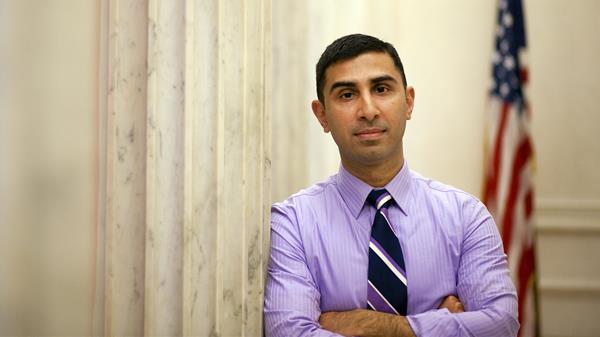Faiz Shakir is the National Political Director at the American Civil Liberties Union (ACLU). Prior to joining the ACLU, Shakir was a senior advisor to Senate Democratic Leader Harry Reid and House Democratic Leader Nancy Pelosi. He has also worked at the Center for American Progress, a leading liberal think tank, and as the editor-in-chief of Thinkprogress.org, a political news site.
BPR: How has the role of the ACLU changed during the Trump administration?
FS: There has been an unprecedented assault on civil rights and civil liberties across the board in a way that feels rather breathless here at the ACLU. It’s like whiplash, you are constantly fighting on so many different fronts.The challenge is to stay grounded in the key priorities and key fights, and not get distracted with charades that the president might be playing with his Twitter account and to focus on the areas where real harm is being felt by people as a result of the policies that [Trump] is pursuing.
BPR: The ACLU received a huge surge in donations after Trump’s election. Has this support diminished as Trump’s term has progressed?
FS: We saw a surge unlike anything that a lot of institutions had ever seen before. Over the course of a weekend, we got millions of dollars of donations, and over the first few months of the Trump administration, we got a quadrupling of our membership. All of that support strengthened this institution collectively, and it gave us resources to do things that we have never done before. It also gave us the opportunity to grow a grassroots mobilization program. After 9/11, the ACLU was fighting some really critical fights against the Bush administration, but it didn’t have the same level of public support as it does now.
BPR: The ACLU is a nonpartisan organization, but as an organization has explicitly stated its resistance to the Trump administration. Are those two things at odds?
FS: We are very partisan in our defense of the constitution. It’s not about a person, it’s about a policy. We were not geared to oppose Trump as an individual; we were geared to oppose all unconstitutional policies. We are also working with as many Republicans as we can to oppose the excesses of Trump. When you are so strident in your defense of the constitution, it can look like the thing that is guiding you is opposition to Trump, but really it’s a fervent opposition to his policies.
BPR: How successful has the resistance been to the Trump administration’s overreaches?
FS: Certainly, the story of the last few months shows that the resistance to Trump’s assault on civil liberties is working. It has had so much more success than people anticipated, partly because Trump has been an incompetent president. But in addition to that, you look at things like the resistance all across the country to the ACA repeal, or when Jeff Sessions recused himself from the Russia investigation, or when people rushed into the airports on Muslim Ban weekend. There are so many instances where the rising tide of resistance, where people utilize their right to protest, has had meaningful consequences in averting some of the worst excesses of Trump.
BPR: The ACLU has always taken a very broad pro-free speech stance, even defending the white nationalists after the Charlottesville incident this summer. How does the ACLU balance the right to free speech with the consequences of harmful speech?
FS: The limitations and restrictions on speech are most often going to originate against the groups that are least popular. Once you allow that to happen, the downward slide of speech begins. If you start with white nationalists, the next group is Black Lives Matter, then Greenpeace, then pro-choice advocates. You need a broad-based [equality] principle that protects the speech of all. At the same time, we don’t want to get in the business of protecting people who come bearing arms preparing to cause a riot and do physical harm to others. The way to fight speech is more speech. We can defend white nationalists, but we can also mobilize our members and staff to go rally in opposition to white nationalists. Going forward, we are going to see a lot more of that from the ACLU. We might defend people that we disagree with, but also use our increased advocacy strength to mobilize masses in opposition to the speech whose values we abhor.
